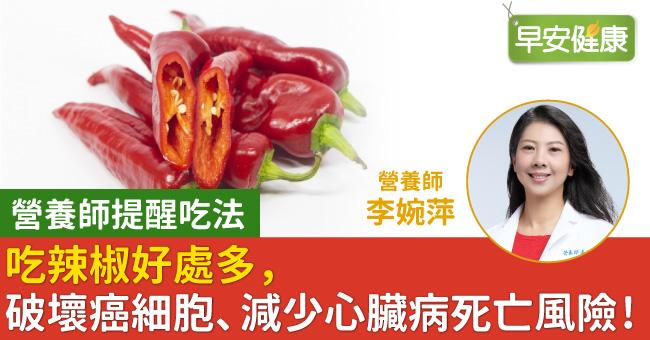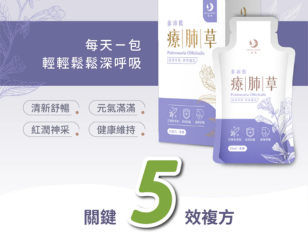那麼,辣味既是痛覺,食用後對人體是安全有益的嗎?關於適度攝取辛辣食物可能帶來的健康好處,以下將一些科學文獻統整給大家參考看看囉!
吃辣好處1:提高代謝率、瘦身減重
有多項研究指出, 辣椒能提高新陳代謝並降低食慾,並且還可透過提升核心溫度,以及活化交感神經、讓棕色脂肪產熱,以刺激身體消耗能量。甚至還有文獻提到,經常攝取辣椒素能明顯減少腹部的脂肪組織。而根據當今流行病學的數據來看,罹病肥胖症的比例較低,和食用含有辣椒素的食物具有相關性。基於各種臨床證據,因此也激發了研究人員運用辣椒素來開發減肥藥物。
吃辣好處2:維護心臟健康
辣椒素具有促進血管健康的重要潛力,包括可能有助降低動脈粥樣硬化、心臟肥大、高血壓和中風等疾病風險。並且,因心臟病而死亡的風險也顯著降低。一項研究發現,經常食用辛辣食物(每週5次以上)的人,其血清中的高密度脂蛋白膽固醇(HDL-C),也就是好膽固醇的濃度,明顯高於不吃辣的受試者。
吃辣好處3:有助延長壽命
一項大型的追蹤研究指出,與每週吃辣少於一次的族群相比,天天吃辣者(每個禮拜約6或7天)的總死亡率風險相對降低14%。其中,若再把不喝酒和有飲酒習慣者做比較,則不喝酒、越常吃辣的人,總死亡率會越低。意思就是說,經常食用辛辣食物可能會活得比較久,但吃辣最好別再配酒。另一個針對一萬六千多名美國成年人飲食的調查數據也發現,食用紅辣椒的人瞬間死亡的風險,比沒吃的人降低了13%。然而,吃辣和直接改善健康、降低死亡率的因果關係,恐怕未來還需要更多研究證實。
吃辣好處4:對抗癌症
多項研究表明, 辣椒素能減緩癌細胞的生長、破壞癌細胞,被認為是一種潛在的抗癌劑,而且對於結腸癌、肝癌、食道癌、膀胱癌、乳腺癌、肺癌等不同類型的惡性腫瘤都有作用。其中,由加州大學洛杉磯分校進行的小鼠研究中發現,使用辣椒素治療不僅能夠抑制前列腺癌細胞的生長,原本健康、正常的細胞也不會受到傷害。
最後,提醒大家注意,因為通常吃辣容易伴隨著重口味飲食,恐有太油或過鹹、下飯吃太多的疑慮,建議不妨選擇新鮮辣椒或加少許醬油烹調、佐餐即可,相對比較健康。
參考資料:
- McCarty, M. F., DiNicolantonio, J. J., & O’keefe, J. H. (2015). Capsaicin may have important potential for promoting vascular and metabolic health. Open Heart, 2(1), e000262.
- Yoshioka, M., St-Pierre, S., Drapeau, V., Dionne, I., Doucet, E., Suzuki, M., & Tremblay, A. (1999). Effects of red pepper on appetite and energy intake. British Journal of Nutrition, 82(2), 115-123.
- Ludy, M. J., & Mattes, R. D. (2011). The effects of hedonically acceptable red pepper doses on thermogenesis and appetite. Physiology & behavior, 102(3-4), 251-258.
- Varghese, S., Kubatka, P., Rodrigo, L., Gazdikova, K., Caprnda, M., Fedotova, J., … & Büsselberg, D. (2017). Chili pepper as a body weight-loss food. International journal of food sciences and nutrition, 68(4), 392-401.
- Leung, F. W. (2014). Capsaicin as an anti-obesity drug. Capsaicin as a therapeutic molecule, 171-179.
- Whiting, S., Derbyshire, E., & Tiwari, B. K. (2012). Capsaicinoids and capsinoids. A potential role for weight management? A systematic review of the evidence. Appetite, 59(2), 341-348.
- Xue, Y., He, T., Yu, K., Zhao, A., Zheng, W., Zhang, Y., & Zhu, B. (2017). Association between spicy food consumption and lipid profiles in adults: a nationwide population-based study. British Journal of Nutrition, 118(2), 144-153.
- Ofori-Asenso, R., Mohsenpour, M. A., Nouri, M., Faghih, S., Liew, D., & Mazidi, M. (2021). Association of Spicy Chilli Food Consumption With Cardiovascular and All-Cause Mortality: A Meta-Analysis of Prospective Cohort Studies. Angiology, 72(7), 625-632.
- Lv, J., Qi, L., Yu, C., Yang, L., Guo, Y., Chen, Y., … & Li, L. (2015). Consumption of spicy foods and total and cause specific mortality: population based cohort study. Bmj, 351.
- Chopan, M., & Littenberg, B. (2017). The association of hot red chili pepper consumption and mortality: a large population-based cohort study. PloS one, 12(1), e0169876.
- Mori, A., Lehmann, S., O’Kelly, J., Kumagai, T., Desmond, J. C., Pervan, M., … & Koeffler, H. P. (2006). Capsaicin, a component of red peppers, inhibits the growth of androgen-independent, p53 mutant prostate cancer cells. Cancer research, 66(6), 3222-3229.
- Clark, R., & Lee, S. H. (2016). Anticancer properties of capsaicin against human cancer. Anticancer research, 36(3), 837-843.
- Wu, D., Jia, H., Zhang, Z., & Li, S. (2020). Capsaicin suppresses breast cancer cell viability by regulating the CDK8/PI3K/Akt/Wnt/β‑catenin signaling pathway. Molecular Medicine Reports, 22(6), 4868-4876.
作者介紹:李婉萍營養師,現職榮新診所營養諮詢組副組長,經歷:台北馬偕醫院營養師、亞培營養諮詢專業營養師,認證:中華民國營養師證書、功能醫學研討會認證。著有《洗腎飲食全書》一書。
本文獲 李婉萍營養師授權刊登,原文標題: 吃辣傷身?研究:對健康有益,可提升代謝、保護心臟若想獲取更多專業知識可至「李婉萍的營養天地」臉書粉專搜尋
看了這篇文章的人,也看了...







